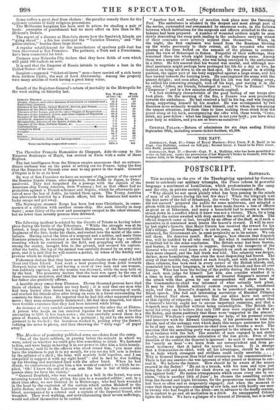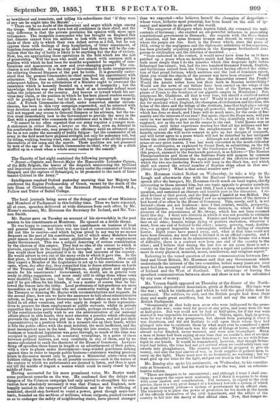POSTSCRIPT.
SATilltDAY.
This morning, on the eve of the Thanksgiving appointed by Govern- ment to celebrate our military triumphs, the rimer echoes in powerful language a sentiment of humiliation, which predominates in the camp and the city, in private society, and even in the Government tffices. "Why should we not speak plainly what has been passing in the minds of men of all classes during the last few days ? • When the telegraph sent the first news of the fall of Sebastopol, the words 'Our attack on the Redan did not succeed' prepared the public for some misfortune, and mingled is gloom with its rejoicing. A few hours more made known a loss of officers as great as at Inkerman, and many a household had to mourn a member struck down in a conflict which it knew was not a victory. Then, for a long fortnight the nation awaited with deep anxiety the arrival of details. The official despatch came at last, brought by en officer of the Staff, as if such a narrative as it contained must insure the bearer's reward. It will be seen by last night's Gazette that Major Curzon has received the reward for his Job's tidings. General Simpson's is yet to come, and,. if we are correctly informed, the Government are in some perplexity as to As nature. We can tell them. He deserves recall. How meagre, 130W obscure that despatch was, will be testified by all who read it. But what it contained and what it omitted led to the same conclusion. The British army had been beaten, and beaten, it was reasonable to suppose, through the incapacity of the General who could send home such a despatch on such an occasion. Two days more elapsed, and the full truth was told. The calamity was deeper, darker, more humiliating, than even the most desponding had feared. The story of that terrible day, related at such length, and with such power, in these columns, has been read in every corner of the British islands, and, translated into many languages, is now before our friends and foes all over Europe. What has been the feeling of the public during the last two days, let each man judge for himself. Let him also consider whether it is a time to keep silence. A comparison of General Simpson's account of the attack with that given by our correspondent will show how fax the Commander-in-chief was informed of what actually, took place. It may be that British military custom requires a bald, unadorned style and that a General's despatch is to be considered analogous to a Royal speech. The full and interesting narratives of Marshal Peliesier and General Niel show, however, that our allies have not arrived at this rigidity of etiquette ; and even the Horse Guards must admit that a General's brevity ought not to excuse important omissions, and that a despatch may be dignified without being unintelligible. The British Ge- neral led every one to believe that only 1500 men were engaged at first at the Redan, and states positively that these were 'supported to the utmost.' Of Colonel Windham's repeated messages for help, of his personal return and interview with Sir Edward Codrington, of his permission to take the Royals, and of the unhappy rout which made this meagre assistance too late to be of any use, the Commander-in-chief does not breathe a word. The assertion that the assaulting party was supported to the utmost, we know to be at variance with the fact. The number of men engaged is not stated clearly, nor is an approximate calculation of the loss given. Even of the duration of the contest the General is ignorant : he says it was maintained for nearly an hour '—we learn from our correspondent and from ge- neral testimony that it lasted for nearly two hours. It is strange that a Commander-in-chief, with all his advantages, should be in error as to facts which strangers and civilians could easily ascertain Why is General Simpson thus brief and erroneous in his communications? There is but one answer—he was ignorant of what passed or desirous to con- ceal it. We believe the former. How should he be aware of the scenes enacted in the Redan ? 'He sat in a trench, with his nose and eyes just facing the cold and dust, and his cloak drawn up over his head to protect him against both.' He makes arrangements which cause every one to ex- claim, 'this is another 18th of June' ; he chooses the assaulting column from the Second and Light Divisions, for the preposterous reason that they had been so often and so desperately engaged; and. when the moment is come that these regiments—consisting of raw lads, and with hardly one man in twenty who had fought at the Alma—are to advance to the deadly contest, he is content to go and sit motionless in a ditch. An unsupported Colonel fights the battle. We have a glimpse of General of Division, but it is only
_ as bewildered and irresolute, and telling his subordinate that if they were of any use he might take the Royals.' . . . .
"There can be no doubt of the discontent and anger which reign among the troops. Officers and men have lost all confidence in their chief, and the only difference is that the private proclaims his opinion with more open vehemence. The incapable commander who has brought on England this last disaster cannot force his soldiers to look with envy on those gallant deeds of their ally to which their own defeat serves as a foil, but he can oppress them with feelings of deep humiliation, of bitter resentment, of hopeless despondency. As long as he shall lead them there will be the con- viction that the day of battle is likely to be anything but the day of victory. Now, too, are approaching those operations in the field which are the test of generalship. Will the man who could not attack with common skill a position with which he had been for months acquainted be capable of com- binations and manceuvres on new and ever-changing ground ? The con- clusion is not difficult. It is the duty of Government to make arrangements for relieving General Simpson of the post he holds. It is generally under- stood that the present Commander-in-chief accepted his appointment with reluctance. This does not, indeed, excuse him from all responsibility for subsequent failure% for no solicitations of a Minister ought to overcome the resistance which is honestly founded on a sense of incapacity ; but the knowledge that his was only the minor fault of an irresolute refusal must soften the judgment of the country. Any honour or reward which his ser- vices may claim, or the position in which he has been placed renders seemly, will be grudged by no one ; but let him no longer command our troops ui chief. A French Commander-in-chief, under somewhat similar circum- stances, has been in this very campaign superseded, and he returned with true devotion and an admirable spirit to the command of his division. We will not suggest any course to General Simpson or his advisers, but the na- tion must immediately look to the Government to provide the army in the East with a general who commands its confidence and is likely to retain it.
"It cannot be too often repeated that our army requires a younger man. A statesman in either House, a lawyer on the bench, even an Admiral in his comfortable first-rate, may preserve his efficiency until an advanced age, for he is not under the necessity of bodily fatigue : but the commander of an army in the field must have physical strength not only for sedentary toil, but for riding, walking, bearing wind, rain, and cold, together with all the personal discomforts of the camp and the march. These qualities are not possessed by men of the age of the British Commander-in-chief, who sits in a ditch muffled up in a cloak when a whole army rushes to the assault."



































 Previous page
Previous page